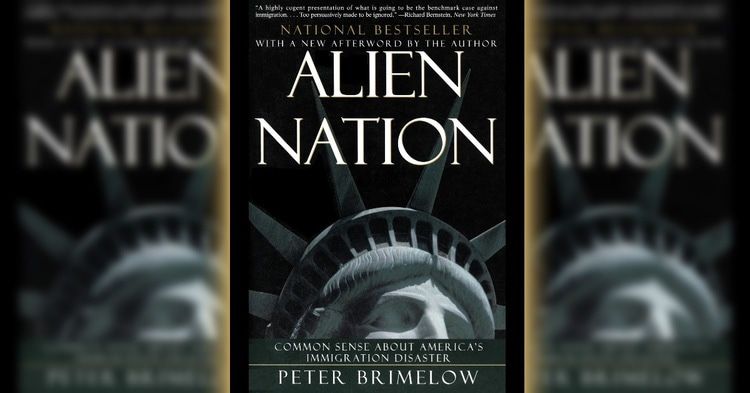
An Immigrant Argues In Favor Of Shutting The Door To America
05/12/1995
By Philip Bennett
Boston Globe, May 12, 1995
BOOK REVIEW
Common Sense About America’s Immigration Disaster
Random House, 327 pp., illustrated, $24
Immigration may be as close as America gets to a creation myth. But Peter Brimelow sees in the record numbers of recent immigrants the seeds of the country’s destruction. Making a case for a temporary ban on all immigration, and eventual permanent reductions, he argues that foreign newcomers threaten a "war on the nation-state," leading possibly to "the snuffing out of the American nation — like a candle in a gale."
"Alien Nation: Common Sense About America’s Immigration Disaster" is a provocative outline of the thinking behind the growing movement to restrict immigration. Expanding a 1992 article in National Review, Brimelow, an editor of Forbes magazine and an immigrant from England, develops many of the arguments that persuaded a majority of California voters last fall to endorse Proposition 187, denying illegal immigrants public education and other social services.
That vote was a preview of what now seems inevitable change in US immigration law. Hardening attitudes toward immigrants may also explain the generally bland critical acceptance of Brimelow’s assertion that immigration is dangerous chiefly for undermining "a plain historical fact: that the American nation has always had a specific ethnic core. And that core has been white." Today, by contrast, he reports, "when you enter the INS waiting rooms you find yourself in an underworld that is not just teeming but is also almost entirely colored."
Brimelow takes a torch to many comfortable assumptions about immigration, including its economic impact (largely negative, he says) and the perception of it as a continuous feature of American history (it has been an intermittent, and traditionally contested, phenomenon). Today about 1 million legal immigrants settle in the country each year, and 300,000 to 500,000 illegally. Brimelow blames ill-considered consequences of the 1965 Immigration Act for the arrival of more than 16.7 million immigrants in the last 30 years. The American "lifeboat" is full, he says. It is time to raise the ladder.
It’s not the numbers alone that Brimelow finds ominous, but that 80 percent of these immigrants are from Asia and Latin America. "There is no precedent for a sovereign country undergoing such a rapid and radical transformation of its ethnic character in the entire history of the world," he concludes.
For a book that aims to be meticulously alarming, this seems like a careless premise. After all, the percentage of America’s foreign-born population was higher in 1910 than today (about 9 percent). But Brimelow performs a neat trick. He writes that earlier immigrants — Germans, Irish and Italians — were already "closely related" by "a common ethnic heritage." This was untrue then; it is untrue now. These immigrants seemed at least as foreign to native-born Americans as a family from Zacatecas, Mexico, today. The difference, of course, is that they were white.
Whether being white is a prerequisite for becoming American is an issue Brimelow does not fully explore. Instead, he cites projections that by 2050, post-1970 immigration will account for 36 percent of the population, a bloc that will act with other nonwhites as "pincers" to strangle the national identity.
One of the things wrong with such predictions is that immigration does not end at the border. How and to what extent new arrivals reconcile the past and future — how they assimilate — is a crucial question of our time, as important as abuses or shortcomings of policy. The country almost certainly changes immigrants more than they change the country. But Brimelow devotes only a few pages to this transaction.
Immigrants, tellingly, are almost entirely absent from the book. In what appears an afterthought, the author ventures for part of an evening to the border, where he watches ghostly figures move across an INS infrared screen. The immigrant is our new Invisible Man: anonymous and everywhere, lurking behind every problem and, it seems, every candidate for higher office. Just as immigration can be an empty vessel for idealized hopes, Brimelow finds its shadow on every woe: crime, disease, welfare, even abortion (which among whites, he speculates, is sometimes due to economic insecurity caused by immigrants).
Brimelow’s own talents for assimilation include mastery of the breezy demagoguery so fashionable in American political speech. Immigration advocates, liberal "alienists" but also The Wall Street Journal are "traitorous." John Tanton, the founder of the Federation of American Immigration Reform, is lauded as "truly a citizen who has taken up arms for his country." The aftermath of the Oklahoma City bombing has made a few passages in "Alien Nation" creepy: "Deep into the twenty-first century, throughout the lifetime of my little son, American patriots will be fighting to salvage as much as possible from the shipwreck of their great republic."
In the coming debate, the reasoning that finds expression in such language may have the kind of unintended, ominous effects that Brimelow sees in current law. Seeking to exclude future immigrants, he finds a threat in millions of new Americans. He risks promoting the division that he warns against.
